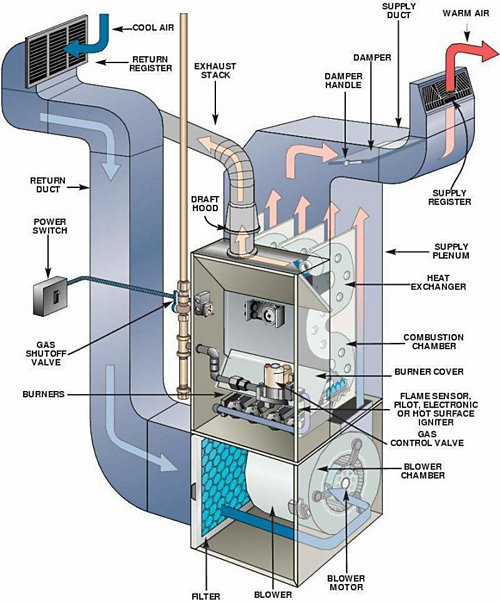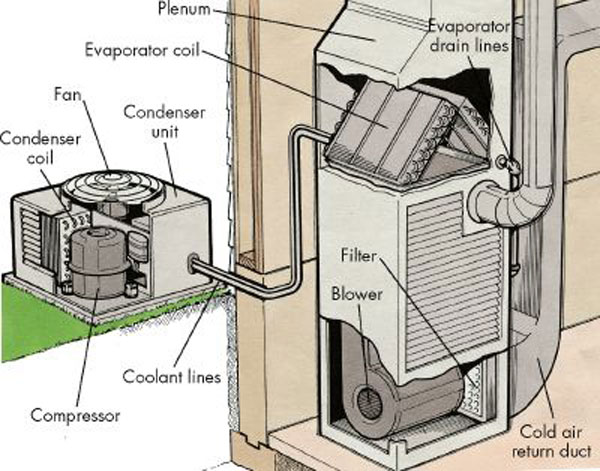Checking Out the Necessary Parts of an Efficient Cooling And Heating System
An effective HVAC system is improved a number of essential parts that function in harmony. Each part, from the thermostat to the ductwork, plays a vital role in keeping comfort and energy performance. Understanding these aspects is essential for maximizing efficiency and improving interior air top quality. As one analyzes these parts, the elaborate connections in between them expose insights into enhancing total system performance. What particular aspects add most to this efficiency?
The Function of the Thermostat in Cooling And Heating Performance

Although frequently neglected, the thermostat plays a vital function in the effectiveness of cooling and heating systems. HVAC experts. This tiny tool serves as the primary control center, controling temperature setups and making certain perfect comfort within a space. By properly picking up the ambient temperature level, the thermostat communicates with the air, air flow, and heating conditioning devices to keep the wanted climate
An effective thermostat minimizes energy intake by triggering the HVAC system only when needed, thus avoiding too much heating or air conditioning. Modern clever and programmable thermostats improve this performance further by enabling customers to set timetables and from another location change setups, adjusting to day-to-day routines.
Additionally, the positioning of the thermostat is essential; incorrect place can cause incorrect temperature analyses, leading to ineffective operation. On the whole, a well-functioning thermostat not just boosts comfort however additionally adds significantly to energy financial savings and the long life of the HVAC system.
Understanding the Significance of Air Filters
Air filters serve an essential feature in heating and cooling systems by ensuring that the air flowing within a room remains tidy and healthy and balanced. These filters trap dust, allergens, and other contaminants, avoiding them from being recirculated throughout the setting. By capturing these particles, air filters add to improved indoor air high quality, which can considerably benefit owners' health and wellness, particularly those with allergies or respiratory problems.
In addition, maintaining clean air filters enhances the efficiency of heating and cooling systems. Stopped up filters can limit airflow, triggering the system to work more challenging to preserve desired temperatures, causing boosted power intake and greater utility bills. Routinely replacing or cleaning filters is an important maintenance step that can lengthen the life-span of a/c tools. Inevitably, recognizing the importance of air filters allows home owners and building supervisors to take aggressive procedures to ensure a well-functioning, efficient heating and cooling system that advertises a comfy and risk-free indoor setting.

The Capability of the Heater and Heat Pump
Furnaces and heatpump are vital parts of a/c systems, in charge of providing warmth during cooler months. Heating systems operate by heating air via combustion or electrical resistance, then distributing it throughout the home through ducts. They generally supply rapid home heating and can be sustained by gas, electricity, or oil, depending on the system kind.
Conversely, heatpump move warm instead than generate it. They draw out heat from the outdoors air or ground, also in reduced temperature levels, and transfer it inside your home. HVAC experts. This twin capability permits warm pumps to additionally provide cooling in warmer months, making them versatile choices for year-round environment control
Both systems call for proper maintenance to guarantee effectiveness and longevity. While heating systems stand out in severe cool, look at these guys warmth pumps can be helpful in modest climates. Recognizing their unique functionalities help home owners in selecting one of the most suitable alternative for their heating requires.
Discovering the Air Conditioning Unit
The cooling unit is an essential element of HVAC systems, offered in different types to suit various requirements. Recognizing the performance ratings of these devices is important for making notified options regarding power intake and expense. This section will discover the varied kinds of a/c unit and clarify exactly how effectiveness ratings impact efficiency.
Kinds of Air Conditioners
While different aspects affect the selection of a/c systems, comprehending the different types readily available is essential for property owners and structure managers alike. Central air conditioners are created to cool down entire homes or buildings, using a network of air ducts for air flow. Window units provide an even more local option, perfect for little spaces or solitary areas. Mobile a/c offer flexibility, permitting individuals to move the unit as needed. Ductless mini-split systems are another alternative, integrating the efficiency of central systems with the ease of zoning, as they need no ductwork. Geothermal systems harness the planet's temperature for energy-efficient cooling. Each kind features distinct benefits, making notified choices essential for reliable climate control.

Performance Scores Explained
Comprehending look at more info efficiency rankings is important for choosing the best a/c device, as these metrics supply understanding into the system's performance and power intake. The most typical rating for ac system is the Seasonal Power Efficiency Proportion (SEER), which determines the cooling output throughout a normal cooling period split by the total electrical energy input. A higher SEER suggests better efficiency. In addition, the Power Effectiveness Proportion (EER) is used for gauging performance under particular conditions. Another vital metric is the Energy Celebrity certification, which signifies that a device meets stringent energy efficiency standards. By examining these rankings, consumers can make educated selections that not just maximize convenience yet additionally decrease power costs and environmental impact.
The Importance of Ductwork and Air flow
Effective ductwork style and air flow monitoring play important duties in the overall effectiveness and performance of a/c systems. Correct ductwork guarantees that conditioned air is dispersed evenly throughout an area, lessening temperature changes and improving convenience. Properly designed air ducts decrease resistance to air flow, reducing the work on heating and cooling tools and eventually reducing energy consumption.
Air flow administration includes tactically positioning vents and registers to improve the flow of air. This prevents common issues such as cold or hot places, which can occur when airflow is obstructed or improperly balanced. Additionally, the best air duct products and insulation can additionally boost effectiveness by lowering warmth loss or gain throughout air transportation.
An efficient ductwork system not just adds to energy financial savings but can likewise lengthen the lifespan of heating and cooling tools by minimizing unnecessary strain (HVAC experts). Understanding the significance of ductwork and airflow is vital for achieving peak Heating and cooling system performance.
Routine Upkeep Practices to Improve Efficiency
Regular maintenance techniques are essential for ensuring peak efficiency of cooling and heating systems. These practices consist of regular examinations, cleaning, and needed fixings to maintain the system running efficiently. Frequently changing air filters is essential, as clogged filters can block airflow and decrease performance. On top of that, technicians must check and clean evaporator and condenser coils to avoid getting too hot and power waste.
Annual expert examinations are also advised, as qualified service technicians can identify possible issues before they intensify. Oiling moving components reduces wear and tear, contributing to a longer life-span for the system. Ensuring that the thermostat operates correctly help in maintaining suitable temperature level control.
Often Asked Questions
Just how Often Should I Change My Thermostat?
Thermostats ought to normally be changed every 5 to one decade, depending upon use and modern technology advancements. Normal checks are advisable to guarantee peak efficiency, especially if experiencing irregular temperature level control or increased power expenses.
What Dimension Air Filter Is Best for My Heating And Cooling System?
The most effective size air filter for more a HVAC system varies by system design. Commonly, it's crucial to speak with the owner's manual or check the existing filter measurements to guarantee peak performance and air top quality.
Can I Install a Warmth Pump Myself?
Installing a heatpump independently is feasible for proficient people, however it needs knowledge of electric systems and neighborhood codes. Hiring a specialist is suggested to guarantee appropriate installation and perfect system efficiency.
Exactly how Do I Know if My Ductwork Is Efficient?
To identify ductwork efficiency, one must examine for leaks, step airflow at vents, inspect insulation high quality, and examine temperature level differences in between supply and return ducts. Professional assessments can supply comprehensive insights into general efficiency.
What Are Signs My HVAC Needs Immediate Maintenance?
Indications that a heating and cooling system requires immediate upkeep consist of unusual noises, irregular temperature levels, enhanced energy costs, unpleasant odors, and regular biking. Resolving these issues promptly can protect against more damages and warranty peak system efficiency.
Air filters serve a vital feature in Heating and cooling systems by ensuring that the air distributing within an area remains clean and healthy. In addition, preserving tidy air filters enhances the performance of HVAC systems. Ductless mini-split systems are an additional alternative, integrating the efficiency of central systems with the benefit of zoning, as they call for no ductwork. Recognizing effectiveness rankings is necessary for choosing the ideal air conditioning device, as these metrics offer understanding right into the system's performance and power consumption. The finest size air filter for a HVAC system varies by unit layout.